So, I ran into a weird issue using an ipython notebook and not sure what to do. Normally, when I run a part of the code, if there is an error, I would trace it back, fix it, and then re-run the code. I was doing a similar thing but even after making changes to the code, it looks like nothing is changing!
Here is the example... I am using Python 3.5 so xrange is gone. This then caused an error to be thrown:
XXXX
24 XXXX
25 XXXX
---> 26 for t in xrange(0,len(data),1):
27
28 XXXX
NameError: name 'xrange' is not defined
but after changing my code (which you can see below the difference in line 26), the same error pops up!
XXXX
24 XXXX
25 XXXX
---> 26 for t in range(0,len(data),1):
27
28 XXX
NameError: name 'xrange' is not defined
Any ideas on why this would be happening?
